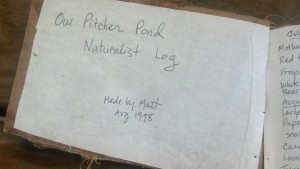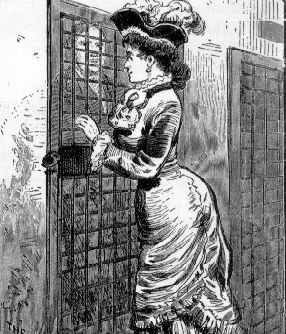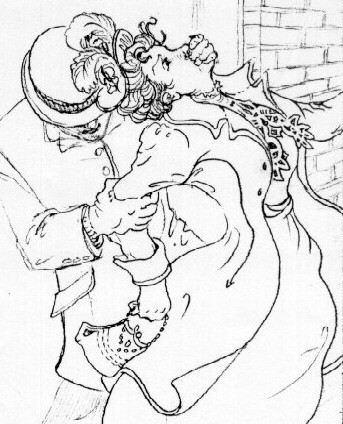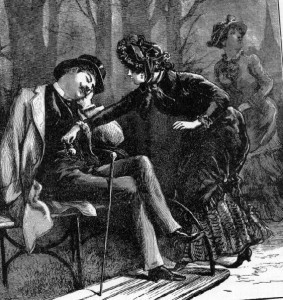Lea Wait's Blog, page 315
July 27, 2014
Rhine Mystery #2 — Solved!
Susan Vaughan here.
If you read my June post about Dutch windmills (http://bit.ly/1lZ6iND), you’ll realize this month’s post continuing my cruise up the Rhine River is out of order. Should’ve posted about Amsterdam first. But here goes. Venice, Italy, is known as the city of canals because it’s built on a group of islands. So why Amsterdam in northern Europe?
We spent two and a half days in beautiful Amsterdam. It’s a very walkable city, not too large, with excellent public transportation. The biggest hazard is the hundred thousand bicycles zooming along the bike paths and streets. A pedestrian doesn’t dare cross pavement without checking for bikes. The Central Station even has a three-deck parking garage only for bicycles. They’re parked everywhere along the street and canals as well.
We saw ads for bike tours but shuddered at the image of tourists trying to navigate among all the locals. Not us. We used the Hop on-Hop Off buses and canal boats. Here’s where we waited for a canal boat.
While much of Amsterdam is modern and high tech, like the science museum called NEMO, we tended to explore the older, central parts of the city.
The towers of the ancient city gate dated from centuries ago when the city was much smaller and had to be defended from invaders.
Houseboats, some created out of barges, parked on the canals. Owners pay taxes and receive city services like sewage and water.
More canals, some with houses leaning a bit because of shifting foundations on a sandy bottom.
More canals and bridges, very scenic, some narrow.
Some wide and exotic, with cafes and hotels. We wanted to eat at this cafe and gaze out at the passing boats but we ran out of time.
So, why the canals? Dam Square, known locally only as the Dam (Dutch: de Dam) derives its name from its original function: a dam on the Amstel River, hence also the name of the city (Amstel Dam > Amsterdam). Built in approximately 1270, the dam formed the first connection between the settlements on the sides of the river. Today the upper part of the Dam is a busy town square with the royal palace, the Madame Tussaud’s Wax Museum, and hotels.
Other dams and dikes do the same for the Rhine and other rivers. The Rhine’s a wild river, or at least it was centuries ago. Uncontrolled, the water flowed in a Delta far and wide. Upstream in the 1800’s, engineers worked to shorten and tame the Rhine, while in the Netherlands (Lowlands, the reason all the water flows to there) Dutch engineers designed and constructed the dams, dikes, and canals that tamed the waters and made them navigable.
Why, you may be wondering, did the Dutch want to build a city where the water could swamp them at any time? Our tour guide’s answer: “Whoever controlled the mouth of the Rhine, controlled the shipping.”
*** My newest release is a box set of the Task Force Eagle trilogy for your Kindle. You can find excerpts and buy links at www.susanvaughan.com.
July 25, 2014
Weekend Update: July 26-27, 2014
 Next week at Maine Crime Writers there will be posts by Susan Vaughan (Monday), Lea Wait (Tuesday), Vaughn Hardacker (Wednesday), James Hayman (Thursday), and Barbara Ross (Friday).
Next week at Maine Crime Writers there will be posts by Susan Vaughan (Monday), Lea Wait (Tuesday), Vaughn Hardacker (Wednesday), James Hayman (Thursday), and Barbara Ross (Friday).
In the news department, here’s what’s happening with some of us who blog regularly at Maine Crime Writers:
 From Susan Vaughan: Just released! TASK FORCE EAGLE, Books 1-3 Box Set, Romantic Suspense by Susan Vaughan. When federal agents Rick Cruz, Jake Wescott, and Holt Donovan go after a Mexican cartel kingpin, they face unexpected hazards—to their hearts. http://amzn.to/1wN9v37
From Susan Vaughan: Just released! TASK FORCE EAGLE, Books 1-3 Box Set, Romantic Suspense by Susan Vaughan. When federal agents Rick Cruz, Jake Wescott, and Holt Donovan go after a Mexican cartel kingpin, they face unexpected hazards—to their hearts. http://amzn.to/1wN9v37
From Kathy Lynn Emerson (aka Kaitlyn Dunnett): I’ve just had confirmation of publication dates for the first in the new mystery series set in 1582-3 in England and Muscovy (now Russia) and featuring a new sleuth, Rosamond Jaffrey. As Rosamond Appleton, illegitimate daughter of Lady Appleton’s late husband, she previously appeared (as a child) in several of my  Face Down Mysteries. Now she’s all grown up, married, estranged from her husband, and recruited to gather intelligence for the Crown. Murder in the Queen’s Wardrobe will be out in hardcover in the U.K. on November 28, 2014 and available here in the U.S. on March 1, 2015. I’ve also received a cover proof. Apparently headless woman covers are still “in.” I was more surprised to discover that the book is being billed as “an Elizabethan spy thriller.” And here I thought I’d written a cozy historical mystery!!! Then again, I don’t suppose there’s any reason it can’t be both.
Face Down Mysteries. Now she’s all grown up, married, estranged from her husband, and recruited to gather intelligence for the Crown. Murder in the Queen’s Wardrobe will be out in hardcover in the U.K. on November 28, 2014 and available here in the U.S. on March 1, 2015. I’ve also received a cover proof. Apparently headless woman covers are still “in.” I was more surprised to discover that the book is being billed as “an Elizabethan spy thriller.” And here I thought I’d written a cozy historical mystery!!! Then again, I don’t suppose there’s any reason it can’t be both.
This weekend, July 25-27, Beyond the Sea, a bookstore and gift shop in Lincolnville, Maine, will be hosting a book festival! For details, see http://www.beyondtheseamaine.com/events.html Saturday is mystery and suspense day, and Dorothy, Kate and Kaitlyn will be there. Lea Wait will be talking about her books and signing her Uncertain Glory and Shadows on a Cape Cod Wedding Sunday afternoon, from 1 until 3.
Our traveling gift basket, which will eventually belong to one of you, will be there with us. Loads of great books, some crime scene tape, and two adorable cookies cutters–a moose and a lobster. Stop in and see us and sign up on our entry sheet, or leave a comment on one of our blogs during the next two weeks. Someone is going to be a lucky winner.
Thursday, July 31, you can find Lea Wait in Bar Harbor. She’ll be speaking about Uncertain Glory (set  in Maine during the first two weeks of the Civil War) at the Jessup Library at 10:30, and bringing with her some antiques from the mid-19th century. Then, from 1-3 p.m. she’ll be signing her books (historical novels and mysteries) at the Shermans in downtown Bar Harbor.
in Maine during the first two weeks of the Civil War) at the Jessup Library at 10:30, and bringing with her some antiques from the mid-19th century. Then, from 1-3 p.m. she’ll be signing her books (historical novels and mysteries) at the Shermans in downtown Bar Harbor.
John Clark here: I will be at the author’s tea in Greenville 1-4 pm this Sunday, as part of the Thoreau-Wabanaki Trail Festival. This will be at the Center For Moosehead History.
An invitation to readers of this blog: Do you have news relating to Maine, Crime, or Writing? We’d love to hear from you. Just comment below to share.
And a reminder: If your library, school, or organization is looking for a speaker, we are often available to talk about the writing process, research, where we get our ideas, and other mysteries of the business. Contact Kate Flora: mailto: kateflora@gmail.com
July 24, 2014
And a Mole on Her Toe, Ho-Ho
 Hello again from Sarah Graves, writing to you from Eastport, Maine, where we have survived the Fourth of July and are well into the sweetly peaceful stretch between it and the Pirate Festival. And the Salmon Festival. And we just had the British are Coming festival, and Indian Days are the week after next, and — well, you get the idea. If things get any more festive around here we’ll have to bestow a liquor license on the whole town and just put beer or at least wine coolers in the children’s lemonade stands.
Hello again from Sarah Graves, writing to you from Eastport, Maine, where we have survived the Fourth of July and are well into the sweetly peaceful stretch between it and the Pirate Festival. And the Salmon Festival. And we just had the British are Coming festival, and Indian Days are the week after next, and — well, you get the idea. If things get any more festive around here we’ll have to bestow a liquor license on the whole town and just put beer or at least wine coolers in the children’s lemonade stands.
Also, fireworks. Can I just say right here that I like fireworks as much as the next person? That is, if  the next person happens to be a nervous golden retriever with hyperacute hearing and complete confidence in her ability to make me sleep on the floor with her until she stops shaking. Which will be next week. Actually, fireworks on the Fourth of July itself are one thing. Store-bought M-80s, cherry bombs, and other implements of auditory mayhem set off at random by sozzled Neanderthals with little or no…er, I mean, they are entirely another. Although my dog doesn’t think so.
the next person happens to be a nervous golden retriever with hyperacute hearing and complete confidence in her ability to make me sleep on the floor with her until she stops shaking. Which will be next week. Actually, fireworks on the Fourth of July itself are one thing. Store-bought M-80s, cherry bombs, and other implements of auditory mayhem set off at random by sozzled Neanderthals with little or no…er, I mean, they are entirely another. Although my dog doesn’t think so.
 Meanwhile, I really did have a mole on my toe, and it was the weirdly interesting kind of mole that all the literature says if you have one like it, you should See Your Dermatologist. What they really mean, though, is that your dermatologist should see you, and especially the mole, and he did. While he was seeing it, I said, “Do you think this should come off and be sent to the pathology laboratory?” and he said, “Stick your foot out.”
Meanwhile, I really did have a mole on my toe, and it was the weirdly interesting kind of mole that all the literature says if you have one like it, you should See Your Dermatologist. What they really mean, though, is that your dermatologist should see you, and especially the mole, and he did. While he was seeing it, I said, “Do you think this should come off and be sent to the pathology laboratory?” and he said, “Stick your foot out.”
Next thing I knew, I couldn’t feel my toe, and the next  thing after that was, the mole and I had parted ways forever. None of it hurt except for one teensy tiny pinch. Really, the whole thing was a piece of cake, they treated me with absolutely heart-melting kindness from start to finish, and just four days later I learned I did not have a melanoma, which is a very fine thing to learn, let me tell you, and definitely worth the trip. Also, just in case you have a mole that you keep trying to tell yourself is nothing, can I say again about the Didn’t Hurt part? Because it didn’t. So even if they want to take it off, go for it.
thing after that was, the mole and I had parted ways forever. None of it hurt except for one teensy tiny pinch. Really, the whole thing was a piece of cake, they treated me with absolutely heart-melting kindness from start to finish, and just four days later I learned I did not have a melanoma, which is a very fine thing to learn, let me tell you, and definitely worth the trip. Also, just in case you have a mole that you keep trying to tell yourself is nothing, can I say again about the Didn’t Hurt part? Because it didn’t. So even if they want to take it off, go for it.
 Finally — As you can see I’ve sort of sprinkled a bunch of Eastport pictures in here at random. This time of year it kind of knocks the breath out of me, all this summeriness everywhere, so it’s hard for me to be coherent about my pictures (some people say that’s true about me all year round) but I thought you might like to see them anyway. So here they are.
Finally — As you can see I’ve sort of sprinkled a bunch of Eastport pictures in here at random. This time of year it kind of knocks the breath out of me, all this summeriness everywhere, so it’s hard for me to be coherent about my pictures (some people say that’s true about me all year round) but I thought you might like to see them anyway. So here they are.
The Tale of the Naturalist’s Log
There are books we love because they move us, maybe even change the way we live our life.
Vicki Doudera here. Don’t worry — I’m not going to talk about The Goldfinch again. (But that post’s available here if you didn’t get to read it the first time…)
Other books scare the Holy Hannahs out of us, and for lots of reasons we crime writers love to discuss, we enjoy these books as well. For me, that super-scare of a book was The Shining.  So vividly do I recall turning those pages, curled up on our living room couch, shaking in my proverbial boots. (Jaws was another one. Can we ever forget inhaling those novels?)
So vividly do I recall turning those pages, curled up on our living room couch, shaking in my proverbial boots. (Jaws was another one. Can we ever forget inhaling those novels?)
And then there are the books that are special only to us. For some, it’s a treasured family Bible, with names and dates penciled carefully in. Or a tattered paperback that saw its reader through a difficult period. Or a rip-roaring adventure that mirrored a time in the past when we, too, were on a rollercoaster of a ride.
Perhaps most important are the books we make ourselves, full of our own unique stories. I’m not talking about books we write and publish (although those are pretty darn important to their authors, trust me!) but tomes of a more personal nature. Scrapbooks of Christmases going back to our days as a newlywed. Journals of trips taken, discoveries made. Diaries from tortuous times in middle school. Yes, I possess all of these things, including saucy accounts of a college year in Paris, but for me, one of the most treasured books in my collection is The Pitcher Pond Naturalist’s Log, a journal that had its beginnings back in 1998.

 I can’t talk about the Log (photo to right) without mentioning my son Matt, whose 26th birthday is today. Not only is he the creator of the book itself, but, it turns out, he was responsible (albeit unintentionally) for its long disappearance.
I can’t talk about the Log (photo to right) without mentioning my son Matt, whose 26th birthday is today. Not only is he the creator of the book itself, but, it turns out, he was responsible (albeit unintentionally) for its long disappearance.
But let me start in the beginning, back in the summer of ‘98, when my husband and I sold our 11-room Inn in Camden, packed up our possessions, and moved to a camp (if you’re from Maine you know what I mean – for the rest of you, a camp is a small lakeside cottage) that we’d fortuitously purchased only months before.
The camp was – and still is – in Lincolnville, on a narrow, glacier-formed body of water called Pitcher Pond. Ten years before bidding on the place, we’d rented it, and Matt had been all of 2 months old. When the camp went on the market in the spring of ‘98 we put in an offer to purchase it, never dreaming that our bid would be accepted, much less that our business (and home) would sell three months later.
By then our family had grown to include Nate, 8 years old; Lexi, who was four; chocolate Lab Daisy, and cats Tom and Jerry. It was a crazy, whirlwind of a time in our family’s saga. We had two weeks to pack up our personal items at the Inn and get the heck out, all the while flipping flapjacks for guests, taking reservations, and presenting to all of our paying customers a relaxed, serene demeanor, even if we felt far from it.
When we finally found ourselves ex-Innkeepers and new residents of Pitcher Pond, we took about a week to unwind from all the stress. Turns out a little lakeside cottage hailing from the 1950’s was the perfect place to do just that.
It was mid-July, and with all of the fishing, swimming, biking, and BB gun shooting, I’m not sure why this eldest son of mine made the book in the first place.
Probably because, even at age ten, he was the kind of person who liked to craft things with his hands. Chances are he spotted the fabric first, then found some cardboard, grabbed the stapler, paper and scissors, and next thing he knew, he’d made a little book.
I think it was all the wildlife we were witnessing that made me think of starting a Naturalist’s Log. The earliest entries are veritable laundry lists of sightings: porcupines, raccoons, red-tailed hawks, bear scat, paper wasps, and fish ranging from perch to pike. The very first entry? Mother catfish and approx. 100 one inch babies by shore of beach. Believe it or not, I can still recall seeing that incredible sight, marveling with the kids how each one of the babies was a tiny version of the slowly swimming, protective mom. It was something I will most likely never see again.
Before long, the boys were scribbling in their own discoveries. Caught a one foot bass on dock during cookout, wrote Matt in July of 2000. Wanted to eat it but Mom said no. Nate spotted “two grouse and one baby while picking blueberries” in July of 2002. Lexi, still a little young to journal, proved to be an adept finder of unusual creatures, spying tree frogs, salamander eggs, and winged creatures of all types, some of which (if they were dead) we pasted in the journal.
And then, in 2003, the unthinkable happened: the Log disappeared.
That summer, it simply vanished from its customary perch on a shelf in the camp’s living room, and despite searches of both the cottage and our Camden home, the journal did not turn up.
For five long years it remained missing. And all that time it bugged me. For five summers, I asked myself where the hell the book could be. I looked high and low, in every conceivable spot, and still, the little journal refused to be found.
And then, in 2008, I moved a dresser from the boys’ bunkhouse into my camp bedroom. The lowest drawer was stuck shut, and when I finally pried it open, inside lay the Log. The last entry, written in June of 2003, was one dramatic line, scrawled in Matt’s distinctive handwriting.
Today I saw a bald eagle and it flew right over my head.
At last our Log was back, and we wasted no time once more recording discoveries. A meteor shower that lit up the lake. A mother duck and eight tiny ducklings. A spotting of seven loons swimming in a black-and-white pack. Hummingbirds, chipmunks, Lady slippers, Canada geese – the list goes on and on.
Including the notations I made yesterday as I sat on the camp’s screened-in porch. Saw a giant snapping turtle with a shell 18 inches across, a dead bat, and a kingfisher.
Why do we like to record events in our life? For me, the Log is a way of remembering just how multi-layered a natural environment can be, how much diversity can co-exist on a three-mile-long pond in the Maine woods. It’s an account of funny family stories (like the time Nate wrote about a loon swimming under his legs, which years later he admitted was fictitious.) It’s a measure of the months and years, stacking up like firewood, a way to make sure we remember that the times gone by have been rich indeed.
As our Maine summer rolls on, I hope you’re enjoying both words and wildlife. My thoughts today are on Matt, off captaining a yacht in St. Thomas, where he’s spotting everything from sharks to sea turtles. Happy Birthday, Matt, and thank you for creating a very special book.
And to the rest of you, enjoy this beautiful day.

Nate, Lexi and the Birthday Boy home for a visit in June.
July 22, 2014
You’d Think It Would Get Easier
Earlier this year I posted two blogs on the stages of writing a novel. “The Hardest Part” dealt with finding the right place to begin. “A Cure for the Middle-of-the-Book Blahs” was about some of the problems that crop up in mid-book. Now it’s time to talk about endings, or to be more exact, the last third or so of a work in progress.
 You’d think, having developed characters and written about them for fifty or sixty thousand words already, and having worked up a plot of some sort, that the push to the finish would be a piece of cake. By this point even pantsters like me have some idea where the story is going. While that’s true, there are also a lot of choices still to be made, plus a couple of pitfalls that aren’t always easy to avoid.
You’d think, having developed characters and written about them for fifty or sixty thousand words already, and having worked up a plot of some sort, that the push to the finish would be a piece of cake. By this point even pantsters like me have some idea where the story is going. While that’s true, there are also a lot of choices still to be made, plus a couple of pitfalls that aren’t always easy to avoid.
For one thing, there’s the exhaustion factor. I’ve been working on this mystery novel day after day, week after week for months. I really really want to get to the point where I can type “the end.” The scenes I’m writing right now are short on details and heavy on dialogue. They gallop along, hitting the plot points I need to include, and don’t have much depth to them, but at least I’m moving forward. This strong desire to finish will probably lead me to write a rushed climax and denouement that doesn’t do justice to what came before. I tend to be a bit too abrupt in wrapping things up, at least in my rough drafts. Fortunately, I’ll get a chance to improve those scenes when I revise, but that’s a topic for a blog of its own.
It would help if I had a clearer idea what will trigger the climactic scene. At least I’m in good company when I don’t yet know. As the now legendary story goes, until well into filming Star Wars, the script read only, “Darth Vader says something to make Luke mad.”
 Soon, I hope, I will figure out exactly what final clue will allow my detective to determine who dunnit. Confronting the villain may place her in mortal danger. I haven’t decided yet if that is what I want. If I do, will she rescue herself or will someone else have to step in to help her out of trouble? If the villain gets hold of the sleuth or some other important character, the stakes rise, suspense increases, and (in theory) it’s then an easy jump to the climax of the tale—a rescue or an escape; a fight; possibly a death. Ideally, readers end up eagerly turning pages to see what happens next. How to accomplish that in a way that is not a cliché is another tricky part of writing the end of the book.
Soon, I hope, I will figure out exactly what final clue will allow my detective to determine who dunnit. Confronting the villain may place her in mortal danger. I haven’t decided yet if that is what I want. If I do, will she rescue herself or will someone else have to step in to help her out of trouble? If the villain gets hold of the sleuth or some other important character, the stakes rise, suspense increases, and (in theory) it’s then an easy jump to the climax of the tale—a rescue or an escape; a fight; possibly a death. Ideally, readers end up eagerly turning pages to see what happens next. How to accomplish that in a way that is not a cliché is another tricky part of writing the end of the book.
In the best of all possible worlds, plot, subplots, and any loose ends are wrapped up in the last couple of pages and the reader finishes the novel feeling satisfied. Once everything is explained, it becomes apparent that the clues were there all along. The solution makes sense. The reader figured it out at about the same time the sleuth did or, failing that, will admit that the answers were only just out of reach. The author played fair. Providing such explanations, however, can become an end-of-the-book minefield for the writer.
 Many mysteries use a technique syndicated columnist Joel Achenbach called “the obligatory spilling of the beans,” a phrase he coined to mean the scene “where the villain explains his diabolical plot to rule the world, a moment of braggadocio that will lead to his downfall once the hero escapes.” This is the point at which the villain confesses to all his crimes and willingly answers any remaining questions, usually because he plans, immediately after confessing, to kill the sleuth. A last-minute escape or rescue prevents that outcome and the villain gets what’s coming to him (or her). Is the “spilling of the beans” overused? Yes and no. The same plot devices are used over and over again because they work, and because there just aren’t that many ways to bring a mystery novel to a satisfying conclusion. A variation of this is the gather-all-the-suspects-in-the-library ending, in which the sleuth, who may or may not know who dunnit, tricks the villain into confessing.
Many mysteries use a technique syndicated columnist Joel Achenbach called “the obligatory spilling of the beans,” a phrase he coined to mean the scene “where the villain explains his diabolical plot to rule the world, a moment of braggadocio that will lead to his downfall once the hero escapes.” This is the point at which the villain confesses to all his crimes and willingly answers any remaining questions, usually because he plans, immediately after confessing, to kill the sleuth. A last-minute escape or rescue prevents that outcome and the villain gets what’s coming to him (or her). Is the “spilling of the beans” overused? Yes and no. The same plot devices are used over and over again because they work, and because there just aren’t that many ways to bring a mystery novel to a satisfying conclusion. A variation of this is the gather-all-the-suspects-in-the-library ending, in which the sleuth, who may or may not know who dunnit, tricks the villain into confessing.
 An alternative to bean-spilling is to have the sleuth work out what must have happened and explain any elusive details to another character for the benefit of the reader. I always have a bit of a problem with this solution. It just doesn’t seem realistic that any one person could be brilliant enough to solve crime after crime with nary a misstep. I’d rather let my sleuth be misled, or even come up with a completely wrong explanation for the crime first, and then discover additional information that makes the pieces of the puzzle fall into place correctly.
An alternative to bean-spilling is to have the sleuth work out what must have happened and explain any elusive details to another character for the benefit of the reader. I always have a bit of a problem with this solution. It just doesn’t seem realistic that any one person could be brilliant enough to solve crime after crime with nary a misstep. I’d rather let my sleuth be misled, or even come up with a completely wrong explanation for the crime first, and then discover additional information that makes the pieces of the puzzle fall into place correctly.
As I go past the 60,000 word mark heading for 90,000 (on the historical mysteries) or pass 50,000, heading for 75,000 (for the Liss MacCrimmon novels), there are also other challenges to deal with. Holding information back from the reader is one of the hardest for me. Once I’ve worked out what really happened, my impulse is to share that information—or at least insert a big, honking clue. But if I do that too early, or even to hint too strongly at the villain’s identity, it will spoil the suspense.
Years ago, when I was writing Face Down Among the Winchester Geese, the third of the mysteries featuring Lady Appleton, my sixteenth-century gentlewoman, herbalist, and sleuth, she ended up identifying the killer some fifty pages before the end of the book, but she still had to figure out his motive. That quest led to a twist—the revelation of another person’s involvement in the murders. The clues were all there, but I held back this second person’s identity until the last possible moment. Will I try something like that again? I doubt it. It’s not easy to pull off successfully. On the other hand, variations are a possibility. My detective could have the right villain but the wrong motive, necessitating more sleuthing at greater risk. Or the villain might become desperate enough to do something totally unexpected. Twists and double twists at the end of a mystery novel? Great when they work but not easy to do well.
 I mentioned wrapping up subplots, but there are times when I feel a strong temptation not to do so. In a series, there are story arcs that carry over from book to book, usually having to do with the sleuth’s personal life. How much do I want to clear up and how much do I want to leave for the next installment? One thing I do know. I won’t commit the sin of leaving my readers in suspense about anything truly important. Fans were furious at having to wait an entire year to find out whether it was Joe or Ranger at Stephanie Plum’s door saying “Nice dress. Now take it off.” Not knowing if a beloved sidekick of the furry variety was alive or dead at the end of not one but two of Dana Stabenow’s mysteries upset many of her fans, including me. I will not do anything remotely similar to either of those things.
I mentioned wrapping up subplots, but there are times when I feel a strong temptation not to do so. In a series, there are story arcs that carry over from book to book, usually having to do with the sleuth’s personal life. How much do I want to clear up and how much do I want to leave for the next installment? One thing I do know. I won’t commit the sin of leaving my readers in suspense about anything truly important. Fans were furious at having to wait an entire year to find out whether it was Joe or Ranger at Stephanie Plum’s door saying “Nice dress. Now take it off.” Not knowing if a beloved sidekick of the furry variety was alive or dead at the end of not one but two of Dana Stabenow’s mysteries upset many of her fans, including me. I will not do anything remotely similar to either of those things.
The last third of the book is every bit as challenging to write as the first two thirds, especially the last two or three thousand words. When I finally type “the end” I plan to take a nice long break. Maybe work on an entirely different project for a month or two.
Then the revising starts.
Trials and Tribulations of an Old Dog
If I was a dog, I would be a nice old one. I know this to be true because as a person, I am a nice old one. As is the case many times, it is very difficult for an old dog and an old person to learn new tricks. The old dog in me might catch the Frisbee, but I’m certainly not bringing it to you. At best I might spit it out at your feet. The old writer in me might be capable of learning all the new marketing and self-promotion tricks of the trade, but executing them is an entirely different matter. (see spitting Frisbee thing)
If there was such a thing as an Author’s Prom, I would be the guy in the back of the room with a glass of punch in one hand and a notepad in the other, doing my best not to spill punch on the notes of my latest writing project while trying to stay invisible.
A while back, my better half (code word: wife) strongly suggested (code word: nagged) that I become involved in Facebook and Twitter as a way to do self-promotion (code word: brag a whole lot about nothing) and marketing. I listened attentively (code word: zoned out) but didn’t follow up until my better half insisted (code word: threatened) and I finally decided (code word: caved-in) to take a look at this self-promotion (code word: brag a whole lot about nothing) marketing tools.
So I went to Facebook to sign up for a page. Confusing at first (like learning Chinese arithmetic) I navigated (code word: fumbled about clueless) until I managed (code word: dumb luck) to complete the process. I was now a member of the community, but I had no friends, fans and nobody liked me (sort of like the Authors Prom, huh.) My better half pointed out (code word: what are you stupid?) that friends and fans weren’t going to just magically appear without actively seeking them out. So I sought help from the Facebook help page (apparently written in some ancient Latin dialect that hasn’t been spoken in two thousand years) to find out the best way to make friends and fans. In theory (E=MC²) the best way to make Facebook friends and fans is to seek out (code word: stalk) people who are avid readers of your genre and let them know that you’re alive and do a little self-promotion (code word: brag a whole lot about nothing.). I gave it a shot.
After a bit, my wife’s cousin became my first friend. I was immediately treated (code word: bombarded) with photos of her young daughter, the dog and cat doing fun stuff to the young daughter and so on. As charming (code word: as exciting as changing a flat tire) as this was I doubted the young daughter would be perusing bookstores in search of my latest mystery novel anytime soon. (not her fault, she has to learn to walk and read first)
But I kept at it and soon acquired a small army of book reading friends and fans to market my work to. I quickly discovered that many book readers can only read while at Starbucks and while posting photos of their delicious lattes and mochas. Others responded to my posts with their favorite recipe (I got a good one for peach cobbler) and show me pictures of their culinary delights. Other avid readers are farmers (they’re not very good at it as they seem to be missing a lot of farming tools) who apparently live in a place called Farmville, and while farmers are certainly allowed to read, I’m really not much for moving there as they keep trying to get me to do. Some avid book readers are sneaky little devils. Case in point is the woman who, the moment we became friends told me how I could read her latest eBook for free. A bit confused about that, I asked this woman why she would go through the time and trouble to write a book only to give it away for free. She told me to #*^&*##))@((@#$$^. We’re no longer friends. Another case in point are the avid reader friends who, the moment they become your friend see you as a target for their political opinions (code word: out of control foaming at the mouth rant) and can’t wait to share them with you. Some avid reader friends are also avid TV watchers and are seemingly obsessed with The Walking Dead. I don’t watch much TV and wouldn’t know The Walking Dead from The Grateful Dead, except that both are, well, dead. I sent them to un-friend land (which I believe is the next town over from Farmville) to live with the free eBook lady.
Not being one to quit (code word: afraid of your wife) I pressed on and continued to market my work to my audience of avid mystery readers. I found some interesting traits among them. For instance, some can’t wait to tell me the day of the week and that Wednesday is hump day. Others love to post thirty-year-old photos of themselves on Thursday for some reason. Some of my friends are apparently addicted to sugar and constantly bug me about candy and almost daily send me requests to shop at a place called Candy Land. I like a good Snickers bar as much as the next guy, but come on, eat a salad or something. Then there is the group of avid reader fans who are all meteorologists and they just can’t wait to tell me the weather on a daily basis. Complaining about how it’s just 55 degrees in South Carolina in January and they can’t go to the beach. Do I need this after shoveling snow for six hours? Now I’m not sure how many of my avid reader friends actually buy my books, but my guess is none. So I decided to send the lot of them to un-friend land, which left me with my wife’s cousin and she really does have a nice baby, and dog and cat.
Upon learning this, my wife was visibly upset (code word: blood shot out of her eyes) and convinced (code word: my arm still hurts from being twisted) me to give it another shot. I soothed her anger with a nice peach cobbler and climbed back aboard the Facebook train.
After a while I moved over to Twitter. I must confess that I find Twitter friendlier, easier to navigate and a good place to do marketing and brag a whole lot about nothing.
The only real problem that I seem to have is getting the hang of this one hundred and forty characters limitation. However, as an author I s
July 20, 2014
Thirteen Reasons why Maine is the BEST Place to Live
Recently Maine Crime Writers alum Paul Doiron, building on the theme of this year’s crime writing conference, the Maine Crime Wave, wrote a blog post that got a lot of traction on BuzzFeed about why Maine is the scariest place to live: 13 Reasons Maine is the Scariest Place in the World
Well, we’re crime writers, often looking on the dark side, so we agree with Paul. Back roads. Isolation. People so desperate for drugs they’ll do anything. A vast coastline that lends itself to smuggling. Crashing surf, surprise storms, unexpected undertow, the deadly distortions of fog. A whole lot of people with guns. Indeed, we often find ourselves quoting that great Conan Doyle passage from Sherlock Holmes:
“Good heavens!” I cried. “Who would associate crime with these dear old homesteads?”
“They always fill me with a certain horror. It is my belief, Watson, founded upon my experience, that the lowest and vilest alleys in London do not present a more dreadful record of sin than does the smiling and beautiful countryside.”
“You horrify me!”
“But the reason is very obvious. The pressure of public opinion can do in the town what the law cannot accomplish. There is no lane so vile that the scream of a tortured child, or the thud of a drunkard’s blow, does not beget sympathy and indignation among the neighbours, and then the whole machinery of justice is ever so close that a word of complaint can set it going, and there is but a step between the crime and the dock. But look at these lonely houses, each in its own fields, filled for the most part with poor ignorant folk who know little of the law. Think of the deeds of hellish cruelty, the hidden wickedness which may go on, year in, year out, in such places, and none the wiser.”
The Adventures of Sherlock Holmes (1892)
Sherlock Holmes in “The Copper Beeches” (Doubleday p. 323)
But we also wanted to offer, on behalf of Mainers everywhere, our own 13 Reasons Maine is the BEST Place in the World.
So, starting today, and appearing in our weekend updates for the next few weeks, are the reasons:
 Getting Directions: As Kaitlyn Dunnett wrote in one of her earliest posts, Turn Right at the Refrigerator, people in Maine tend to be rather practical about giving directions. Kate Flora likes to tell guests arriving on Bailey Island that if they come to the end of the road–they’ve gone too far. And we’re lucky that we’ve got plenty of unusual landmarks–the flying moose. The Paul Bunyan statue. The giant blueberry. There’s plenty of scenery to gaze at wherever you go in the state, but you’ll also want to keep your eyes out for some of the unexpected sights.
Getting Directions: As Kaitlyn Dunnett wrote in one of her earliest posts, Turn Right at the Refrigerator, people in Maine tend to be rather practical about giving directions. Kate Flora likes to tell guests arriving on Bailey Island that if they come to the end of the road–they’ve gone too far. And we’re lucky that we’ve got plenty of unusual landmarks–the flying moose. The Paul Bunyan statue. The giant blueberry. There’s plenty of scenery to gaze at wherever you go in the state, but you’ll also want to keep your eyes out for some of the unexpected sights.
If you come to the flying moose, you’ve gone too far.
When you get to Paul Bunyan, take the next right.
Maybe you need to stop here and buy some blueberry-related products?
Whoopie Pies. Yes. That’s right. From country stores and grocery stores, from mom’s school lunches to trucks parked along the road, Maine is home to a fabulous selection of whoopee pies that go way beyond the traditional chocolate. Strawberry. Pumpkin. Maple. Oatmeal cookie.
And if you think we’re kidding, go here: www.wickedwhoopies.com
Where Your Dog is as Welcome as You Are: Dorothy Cannell says that her dog is so used to shopping with her at Reny’s in Belfast that he thinks he ought to have his own credit card.
Wildlife. Many places, you have to go a zoo or on safari to see wildlife. In Maine, often as not, the wildlife will come to you. Here are some recent wildlife sightings:

July 18, 2014
Weekend Update: July 19-20, 2014
 Next week at Maine Crime Writers there will be posts by Kate Flora (Monday), Al Lamanda (Tuesday), Kaitlyn Dunnett (Wednesday), Vicki Doudera (Thursday), and Sarah Graves (Friday).
Next week at Maine Crime Writers there will be posts by Kate Flora (Monday), Al Lamanda (Tuesday), Kaitlyn Dunnett (Wednesday), Vicki Doudera (Thursday), and Sarah Graves (Friday).
In the news department, here’s what’s happening with some of us who blog regularly at Maine Crime Writers:
If any of you happen to see a copy of the summer edition of Mystery Scene Magazine, take a look at the crossword puzzle on page 68. Books by both Lea Wait and Kaitlyn Dunnett show up as clues.
Lea and Kaitlyn (also appearing as Kate Emerson and Kathy Lynn Emerson), together with Kate Flora and Dorothy Cannell and many other Maine writers, will be participating in the Beyond the Sea Book Festival in Lincolnville Beach, which runs for three days, July 25-27. The full schedule is at http://www.beyondtheseamaine.com/events.html
An invitation to readers of this blog: Do you have news relating to Maine, Crime, or Writing? We’d love to hear from you. Just comment below to share.
And a reminder: If your library, school, or organization is looking for a speaker, we are often available to talk about the writing process, research, where we get our ideas, and other mysteries of the business. Contact Kate Flora: kateflora@gmail.com
July 17, 2014
Channeling Jake Brofee
Odd and interesting things make up our memories. When I was a teenager, I listened to this gravel voiced guy do the Farm Market Report on the radio while I was getting ready for school. His name was Jake Brofee and he’d give us the current price for everything from pullets to medium brown eggs, to milk. While the numbers didn’t mean much to me, aside from egg prices (I lived on a working poultry farm, after all), listening to Jake became a part of my morning routine. When I got the idea for this column, I looked Jake up and found he had an interesting career. Born in Madison in 1904, his full name was Linwood Jake Brofee. He graduated from Madison High, Hebron Academy and the University of Maine. After teaching and coaching baseball and basketball at Gorham high from 1931 to 1945, he became farm director for both WCSH TV and radio for the next 30 years. Today, I’m channeling Jake and bringing you the Farm Market Report from 70 Pleasant Street in Hartland, Maine.

Two colors of Astilbe flanking the gazing ball
After a particularly cold and nasty winter here in Somerset County, the garden season dragged its heels. Generally I don’t plant anything before Memorial Day weekend because I’ve been bitten too often by late frosts. This year, it was looking like we might have to wait a couple weeks after the holiday to put anything in the ground because it remained cold and very damp. Mother Nature relented at the last minute and allowed enough sun to poke through cloud cover so the garden plot got tilled on the actual holiday.

Calendulas, impatiens and nasturtiums are flowering or about to with zinnias and glads not far behind.
Even so, seeds tend to respond to soil temperature and that doesn’t rise nearly as fast as air temperatures do. One of the hardest things to do when you’re a gardener is to leave seeds alone once they’re in the ground. Just because they haven’t broken ground when YOU think they should, doesn’t mean they’ve rotted or that the crows have dug them up and scarfed then down.

Please, no broccoli jokes.
Growing things tend to catch up quite nicely given optimum weather conditions. Take our raised bed flower garden, for example. When the snow melted, it looked pretty bleak, but aside from a couple finicky perennials that turned toes up, most of the plants are threatening to outgrow the boundaries. We’ll be doing some serious dividing come fall, with astilbe, delphiniums and primroses to give away. The Mexican sunflowers, zinnias and four o’clocks I started from seed are all on their way to fabulosity and one of my favorite annuals, the calendulas are starting to show their rich orange blooms in the center garden by the red gazing ball.
Not everything survived the harsh winter. The two peach trees which gave us a few delicious treats last year have just a few scattered patches of leaves, but so much of each is winter killed that there’s no way they will make it through another winter. Unless a miracle happens, they will be cut down next April and new fruit trees of a hardier type will take their place.

Wicked fun to pick these.
Our raspberries, however, are gearing up for a banner season. I pruned off the dead ends and canes last month and weeded as much as I could to give them elbow room. Bees and hummingbirds have been busy pollinating them and last week I started picking the red variety. We have about 50 everbearing plants, thirty red and twenty gold. After supper, I head down and pick. The daily return right now is about a quart and they’re extremely large this year.

Darth Vader in miniature?
I’m not the only one attracted to the raspberries. Japanese beetles, something only found in insect books in the days when I was listening to Jake, are now a major problem in the back yard. They love roses, grapes, plums and raspberries, but aren’t so fussy that they won’t devour astilbe and primroses along with the very promising crop of wild blackberries. I’ve heard numerous gardeners say that putting up a Japanese beetle trap simply invites the neighbor’s pests to come over to your place. Instead, I have a glass jar that’s 1/3 full of water and beetle killer. I wander about, tapping them into the mix. The body count is scary. On day one, I nabbed 1006, day two netted 856 and day 3 garnered another 300. We’ve just endured three days of mini-monsoons, so it will be interesting to see how many are caught tomorrow after supper. Two years ago, I tried applying milky spore to see if it would have any effect. I didn’t see one, but will apply it more vigorously this year in an effort to reduce the stress inflicted when hundreds of oversexed beetles chew holes in every available leaf.

Can’t wait until these turn purple.
We have two Stanley plums. The smaller one has never produced anything, but this year it seems to have gotten a second wind. The foliage is thicker and much greener and there are a couple dozen plums ripening. Most of the seventeen apple trees on the property or close to the boundary line are loaded with green apples. Near the raspberries is a very old and wide early Macintosh. Its apples ripen and go soft very quickly, but they have the best Macintosh flavor I’ve ever experienced. I’m hoping I can make both cider and applesauce this year.

Lettuce begin, shall we?
The vegetable garden has really come into its own in the last two weeks. After buying a six-pack of broccoli plants, I planted a row of seeds that were kicking around in the storage building. I think every one came up and as you can see, we’re on our way to having enough broccoli to supply all of Pleasant Street.

Think O’Hara and Johansson might be jealous?
Two rows of corn are really cranking. On hot sunny days following rain, I can see visible evidence of fast growth. Some days, the plants shoot up four to six inches. Our three types of beets are doing well. We’ve already thinned the golden beets and eaten a nice mess of greens. Kale shares a row with summer squash and cucumbers. The kale is ready to be used, sparingly at first, but will be available until the first hard frost. One of our favorite uses for it is to bake it in cider vinegar and then top it with blue cheese. It’s a very healthy dish with amazing flavor. Another good way to use it came from sister Kate who gave us a recipe she calls Power Soup. It’s kale, cider vinegar and hamburger simmered with a few other ingredients. I’ll leave it to her to share the full recipe.

If a woodchuck couldchuck wood, would he leave me alone?
Red and green cabbage, along with cauliflower are holding their own, despite repeated attacks by hungry woodchucks. I’ve killed at least five this year, but every time I think the scourge is over, more of my set plants disappear. They’ve left the three rows of lettuce, my two rows of onions and the beans and peas alone. Lettuce is ready, summer squash will be big enough to eat by Saturday and beans by the first of next week. Two years ago, I found a jar of huge bean seeds while cleaning out my late father-in-law’s woodworking shop. Last year, I planted a handful and discovered they were scarlet runner beans. The flowers are beautiful and the pods twice as wide as a regular bean. In fact the pods are so big they give the impression that they’ve gone by. Cook them up and you’ll find they’re tender and extremely tasty. This year, I planted a fifteen foot row of them and the flowers are already beautifying the back yard.

Welcome to the jungle, Hartland style.
Add a row and a half of snow peas, two small raised beds of carrots, three kinds of basil and three kinds of tomatoes and the only thing left to report on is the annual Clark winter squash plantation. I’m no purist, so whenever we raise a particularly healthy winter squash, I save some of the seeds. This year, we have about 150 plants, comprised of acorn, butternut, buttercup, green hubbard, pumpkin and cantaloupe with some complete mystery seeds mixed in. As you can see from the photo, it’s taking off across the lawn already. If we’re lucky, we’ll have plenty for the winter as well as a goodly amount to share through the Tri-Town food cupboard. I’ll be back in the fall with a followup report.
July 16, 2014
The Bridge House
Hi. Barb here.
My husband Bill bought this cool map of Boothbay Harbor for us on eBay.
In the bottom right corner it says, “copyright 1931 Ethel B. Fowler.” In the bottom left corner it says–
As it happens, I’ve spent hours and hours staring at the Bridge House, since this is the view from our house in Boothbay Harbor.
My husband has taken photos of this view at every time of day, in every season, in every kind of weather. I’m not exaggerating when I say thousands of them. In fact, if you look at the top of this page, you’ll see the Bridge House there on the left in a photo he took.
The Bridge House has been for sale for a couple of years, asking price $775,000. It has town sewer and water and there’s parking on one side of the footbridge.
My daughter, the MFA in Creative Writing student, saw it and suggested it needed to be purchased by someone who would turn it into a writer-in-residency program. What do you think? While the front room is on the footbridge and very public (nothing more boring than watching a writer write), the real glory are the rooms out the back.
Do you think you could work there?
Or there?
Looking at that?
Unfortunately, family finances don’t allow $775,000 for the purchase of a house that’s probably useable four months a year. Or for another impractical property in Boothbay Harbor.
But if you know somebody….
The real estate listing for the Bridge House is here.
A Yankee Magazine article about the Bridge House is here.
What do you think?
Lea Wait's Blog
- Lea Wait's profile
- 509 followers























![Milfoil_Man_Sees_Moose_05_27_06_011[1]_00](https://i.gr-assets.com/images/S/compressed.photo.goodreads.com/hostedimages/1406027557i/10490325.jpg)









